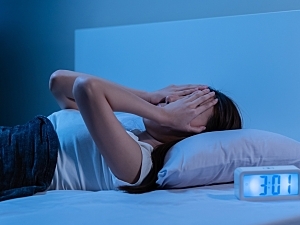Most patients with bipolar disorder experience circadian dysfunction and deficits in attention, verbal memory, and executive functioning, even during periods of euthymia.
Katherine E. Burdick, PhD, director of the Mood and Psychosis Research Program at Brigham and Women’s Hospital and the Jonathan F. Borus, MD distinguished chair in the Department of Psychiatry, and colleagues recently conducted a pilot study of modafinil, a wake-promoting agent, in stable outpatients with bipolar disorder (BD).
Modafinil has been shown to enhance cognition in healthy controls, sleep-disordered individuals, and patients with schizophrenia, major depressive disorder, and certain neurologic disorders. The new findings in BD, reported in Frontiers in Psychiatry, suggest modafinil may have a positive impact on neurocognitive functioning and possibly daytime sleepiness, but it may also have a negative effect on sleep quality.
Methods
Recruitment for the eight-week blinded, placebo-controlled study occurred between March 2014 and November 2017. Rather than remission, the researchers required affective stability, which they defined as a Clinician-Administered Rating Scale for Mania (CARS-M) score ≤8 and a Hamilton Rating Scale for Depression score ≤16 at screening and at the baseline visit.
Other key inclusion criteria were a subjective sleep quality complaint (Pittsburgh Sleep Quality Index [PSQI] total score >5) and/or clinically significant cognitive impairment at screening.
Participants ages 18 to 65 were randomly assigned 2:1 to modafinil or placebo. Dosing started at 100 mg/day, once every morning upon waking, and if tolerated was to be increased to 200 mg every morning. Safety, sleep quality on the PSQI and daytime wakefulness on the Epworth Sleepiness Scale (ESS) were assessed at weekly visits, and neurocognitive testing was conducted at baseline, week 4, and week 8.
Feasibility
Recruitment was difficult and the trial was stopped short of the intended sample size. 18 individuals were enrolled, six were screen fails and two of the 12 randomized patients withdrew from the study, leaving 10 completers.
One patient in the modafinil group dropped out at week 1, reporting decreased energy and concentration. One in the placebo group dropped out at week 1 because she believed she was assigned placebo and wanted to seek an off-label modafinil prescription.
Safety
No serious adverse events were recorded and laboratory results showed no clinically significant changes. The six completers in the modafinil group tolerated the maximum per-protocol dosage of 200 mg/day.
One individual in the modafinil group was removed from the study at week 7 because her CARS-M score indicated hypomania. By the time of her final visit the hypomania had resolved.
Cognitive Functioning
Due to the limited sample size, no definitive conclusions could be drawn, but the team used mixed effects models to offer a preliminary assessment of efficacy. Results for cognitive functioning outcomes showed:
- Greater improvements in speed of processing in the modafinil group compared with the placebo group (P=0.082)
- Greater improvements (or less decline) in verbal learning in the modafinil group compared with the placebo group (P=0.052)
- Regardless of treatment group assignment, significant or marginally significant improvements in composite cognitive functioning score, attention/vigilance, speed of processing and reasoning and problem solving were noted, likely reflecting a practice effect after repeated exposure to cognitive testing
Sleep–Wake Functioning
Results on the PSQI and ESS showed:
- Greater improvements in sleep quality in the placebo group than in the modafinil group (P<0.01)
- Greater improvements in daytime sleepiness in the modafinil group than the placebo group (P=0.15)
Fully Powered Trial Warranted
These findings build a case for further investigation of the potential utility of modafinil in improving cognitive functioning in BD, with an important caveat that the off-label use of modafinil in BD requires close monitoring by the prescriber.
